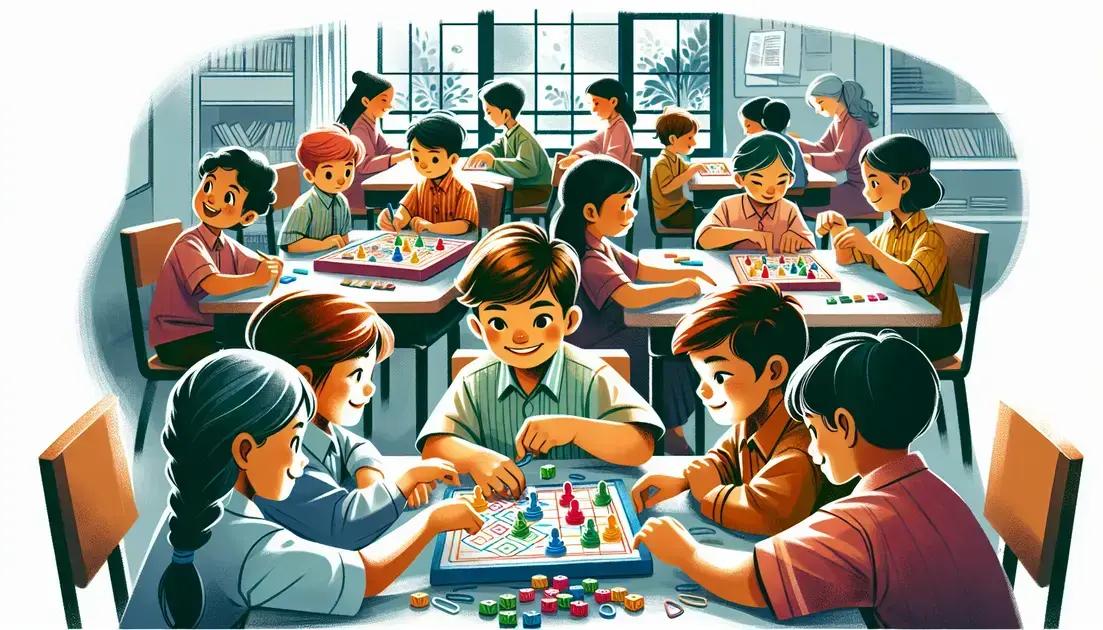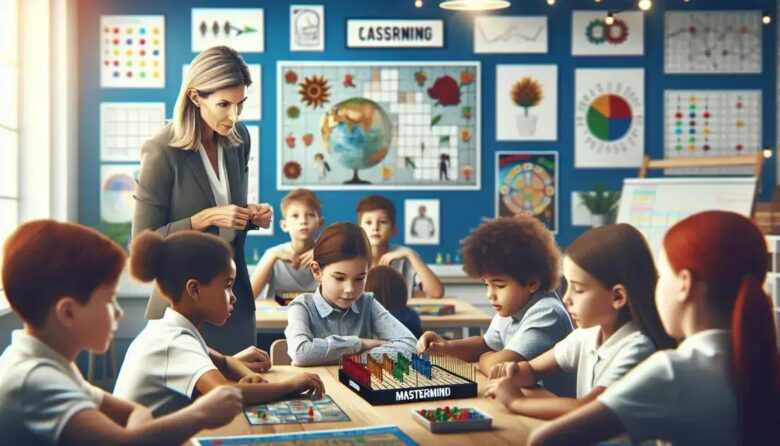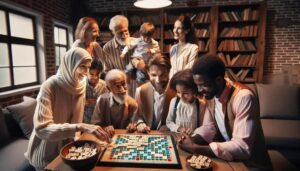Mastermind in classrooms enhances logic skills by promoting critical thinking, pattern recognition, and strategic problem-solving through an engaging, hands-on board game experience adaptable to all ages.
Mastermind board game classroom logic skills seem like a perfect match when it comes to sharpening students’ reasoning abilities. Ever thought how a simple game can transform a classroom dynamic? Let’s dive into why Mastermind gets students thinking harder and more creatively.
understanding mastermind and its gameplay
Mastermind is a classic board game that challenges players to crack a secret code through logical deduction. The game involves one player creating a hidden sequence of colored pegs, while the other player attempts to guess the pattern within a limited number of tries. Each guess is followed by feedback indicating how many colors are correct and in the right position, helping players refine their hypotheses.
Core gameplay mechanics
The process requires players to analyze each piece of feedback carefully, eliminating impossible combinations and narrowing down the options. This back-and-forth fosters deep logical thinking and strategic planning, encouraging players to think several steps ahead.
Why it works for classrooms
Mastermind’s gameplay is simple enough for all ages, but rich in logic challenges, making it a perfect tool in educational settings. It promotes patience, observation, and systematic problem-solving, skills that are valuable both inside and outside the classroom.
Engaging students through play also makes learning feel less like a chore and more like a fun challenge, which can boost motivation and participation in logic-based activities.
how mastermind enhances logical reasoning
Mastermind enhances logical reasoning by encouraging players to think critically about each move and its outcome. As they guess the secret code, they must analyze feedback, recognize patterns, and adjust their strategy accordingly. This process strengthens deductive reasoning and helps develop systematic problem-solving skills.
Step-by-step thought process
Each guess provides clues that narrow down the possibilities. Players learn to make informed decisions by eliminating options that don’t fit the clues, fostering an analytical mindset. This trial-and-error approach is a fundamental part of logical thinking.
Building attention and memory
Players must remember previous guesses and the corresponding feedback to avoid repeating mistakes. This exercise improves working memory and sustained attention, both essential for school success.
When used in classrooms, Mastermind acts as more than just a game. It becomes a practical tool where students practice reasoning skills in a fun, interactive way, translating these abilities into other academic areas.
incorporating mastermind into classroom activities
Incorporating Mastermind into classroom activities is a great way to make learning logic interactive and enjoyable. Teachers can use the game as a centerpiece for lessons on critical thinking, pattern recognition, and strategic planning.
Structured gameplay sessions
Set aside regular times during class for students to play Mastermind in pairs or small groups. This encourages collaborative learning and communication as students discuss their guesses and reasoning.
Integrating with curriculum goals
Mastermind can reinforce math and science concepts by highlighting problem-solving techniques and logical deduction. Teachers can create challenges that align with lesson objectives, making the game both fun and educational.
Custom variations for classroom
Modify the rules or add timed rounds to increase engagement and adapt to different skill levels. For younger students, simplify the code options, while older students can handle more complex patterns and strategies.
Using Mastermind in the classroom promotes a hands-on approach to learning that appeals to diverse learners, fostering persistence and deeper understanding of logic skills.
benefits for different age groups and skill levels

Mastermind is a versatile game that suits different age groups and skill levels, making it ideal for classroom use. For younger students, the game helps develop basic logical thinking and pattern recognition, while older students can tackle more complex strategies and reasoning challenges.
Adapting difficulty for younger learners
Simplifying the color options and allowing more attempts gives younger children a positive experience, building their confidence as they learn how to think logically.
Challenges for older students
Older kids can handle timed rounds or longer code sequences, which sharpen their critical thinking and ability to plan several moves ahead. This supports advanced problem-solving skills that are useful in math and science subjects.
Because Mastermind can be tailored to skill level, it promotes continuous growth and keeps students motivated regardless of their starting point.
examples of classroom success stories
Many classrooms have seen impressive results from using Mastermind to boost logic skills. For instance, a middle school in California reported increased student engagement and improved critical thinking scores after integrating the game into weekly lessons.
Case study: Improved collaboration and reasoning
Teachers noticed students worked better in teams, discussing strategies and explaining their thought processes. This collaboration deepened their understanding of logical deduction.
Case study: Enhanced focus and patience
Another elementary school in New York found that Mastermind helped improve students’ attention spans and patience. Students became more willing to think carefully before making guesses, reflecting stronger self-regulation.
Success stories like these demonstrate how Mastermind can transform learning environments by making logic skills accessible and enjoyable for students across different ages.
tips for maximizing learning through mastermind
To maximize learning through Mastermind, it’s important to create a supportive and engaging environment that encourages students to think critically and reflect on their strategies. Start by explaining the rules clearly and emphasizing the logical reasoning involved.
Encourage open discussion
Allow students to talk through their guesses and reasoning with peers. This collaborative approach helps deepen understanding and exposes players to different problem-solving methods.
Use guided questions
Prompt students with questions like “What does this clue tell you?” or “Which options have you eliminated?” to help them think more analytically rather than guessing randomly.
Vary game difficulty
Adjust the complexity of the codes or limit the number of guesses to challenge students appropriately. Higher difficulty levels promote advanced logical thinking and perseverance.
Incorporating regular reflection sessions after gameplay can help students identify their strengths and areas for improvement, making the learning process more intentional and effective.
measuring improvements in logic skills
Measuring improvements in logic skills after using Mastermind involves both qualitative and quantitative approaches. Teachers can track progress by observing how students approach the game and by using assessments to evaluate reasoning abilities over time.
Observation of gameplay strategies
Watching how students plan, adjust their guesses, and work collaboratively provides insight into their logical thinking development. Increased use of strategic thinking and hypothesis testing signals improvement.
Pre- and post-assessment tests
Teachers can design simple logic puzzles or problem-solving tests to administer before and after regular Mastermind sessions. Comparing results helps measure gains in critical thinking skills.
Student self-reflection and feedback
Encouraging students to reflect on their problem-solving process and challenges faced promotes metacognition. This reflection can serve as an informal measure of growth.
Combining these methods gives a comprehensive picture of how Mastermind enhances classroom logic skills and guides further instructional decisions.
Why Mastermind is a great tool for classrooms
Mastermind helps students improve their logic skills in a fun and engaging way. It encourages critical thinking, problem-solving, and teamwork, all essential skills for learning.
By incorporating the game into classroom activities and measuring progress, teachers can see real improvements in students’ reasoning abilities. With simple adjustments, Mastermind suits a variety of ages and skill levels.
Overall, this board game offers a practical and enjoyable way to support students’ growth in logical thinking, helping prepare them for future academic challenges.




